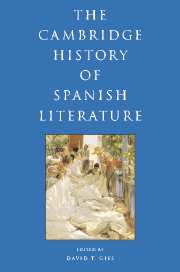Book contents
- Frontmatter
- I INTRODUCTION
- II HISTORY AND CANONICITY
- III THE MEDIEVAL PERIOD
- IV EARLY MODERN SPAIN: RENAISSANCE AND BAROQUE
- V THE ENLIGHTENMENT AND NEOCLASSICISM
- VI THE FORGING OF A NATION: THE NINETEENTH CENTURY
- 22 Romanticism in Spain
- 23 The theatre in Romantic Spain
- 24 Mariano José de Larra
- 25 Romantic poetry
- 26 Romantic prose, journalism, and costumbrismo
- 27 Benito Pérez Galdós
- 28 The Realist novel
- 29 The Naturalist novel
- 30 The theatre in Spain 1850–1900
- 31 Poetry in the second half of the nineteenth century
- VII THE MODERN, MODERNISMO, AND THE TURN OF THE CENTURY
- VIII TWENTIETH-CENTURY SPAIN AND THE CIVIL WAR
- IX IN AND OUT OF FRANCO SPAIN
- X POST-FRANCO SPANISH LITERATURE AND FILM
- Bibliography
- Index
- References
25 - Romantic poetry
from VI - THE FORGING OF A NATION: THE NINETEENTH CENTURY
Published online by Cambridge University Press: 28 March 2008
- Frontmatter
- I INTRODUCTION
- II HISTORY AND CANONICITY
- III THE MEDIEVAL PERIOD
- IV EARLY MODERN SPAIN: RENAISSANCE AND BAROQUE
- V THE ENLIGHTENMENT AND NEOCLASSICISM
- VI THE FORGING OF A NATION: THE NINETEENTH CENTURY
- 22 Romanticism in Spain
- 23 The theatre in Romantic Spain
- 24 Mariano José de Larra
- 25 Romantic poetry
- 26 Romantic prose, journalism, and costumbrismo
- 27 Benito Pérez Galdós
- 28 The Realist novel
- 29 The Naturalist novel
- 30 The theatre in Spain 1850–1900
- 31 Poetry in the second half of the nineteenth century
- VII THE MODERN, MODERNISMO, AND THE TURN OF THE CENTURY
- VIII TWENTIETH-CENTURY SPAIN AND THE CIVIL WAR
- IX IN AND OUT OF FRANCO SPAIN
- X POST-FRANCO SPANISH LITERATURE AND FILM
- Bibliography
- Index
- References
Summary
Significant changes in poetic language, form, and function in Spain reflected a double-faceted response to the seismic shifts occurring in European society at the beginning of the nineteenth century. The reaction against Enlightenment rationalism, materialism, and universalism came first, introduced into Spain by Johann Nikolaus Böhl von Faber (1770–1836). In the course of the 1820s and 1830s, Spanish intellectuals adopted many of the aesthetic ideas derived by Böhl from the German Romantics: the organicist view of culture as the expression of a national spirit (called Volksgeist), the primacy of creative imagination, spontaneity, and emotion in artistic production, and the idealization of the Middle Ages as more evocative of those qualities than the decadent and materialistic contemporary world.
The diffusion of these attitudes meant first of all a widespread reevaluation of the oral poetic tradition, especially Spain’s historical ballads, or romances. Agustín Durán (1789–1862) spurred interest by publishing his carefully compiled ballad collections in a series of well-received volumes beginning in 1828. There was broad agreement among writers and critics that the romancero constituted, in the words of Antonio Alcalá Galiano (1789–1865), “una poesía nacional y natural de consiguiente” (“a national and therefore a natural poetry”). This sense that the traditional ballads expressed a unique, unmediated national essence rapidly enhanced their aesthetic value in lettered culture; by the 1830s Spanish poets were creating their own romances, adopting the sharp contrasts, dramatic situations, and evocative imagery of the traditional ballads.
- Type
- Chapter
- Information
- The Cambridge History of Spanish Literature , pp. 371 - 380Publisher: Cambridge University PressPrint publication year: 2005



